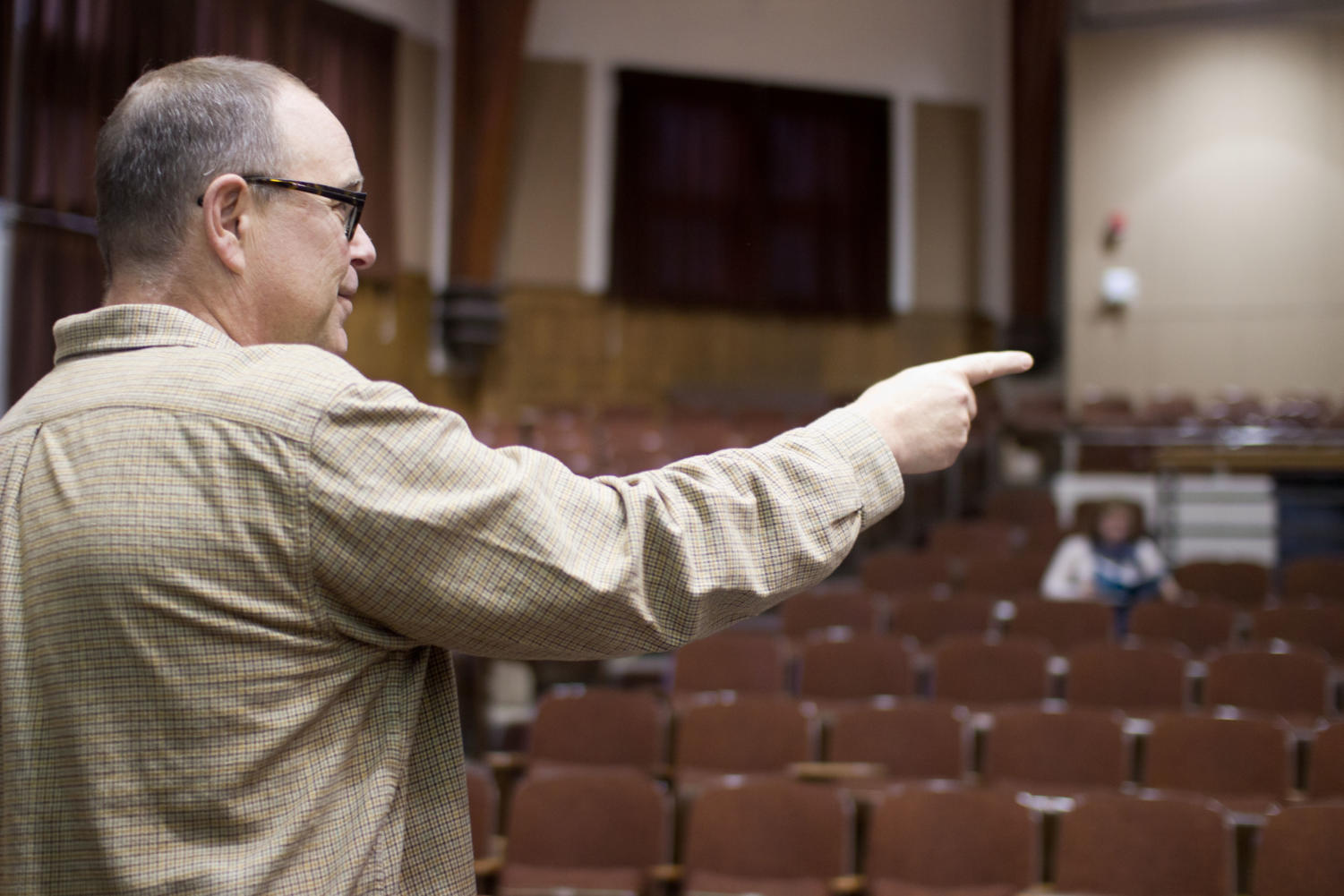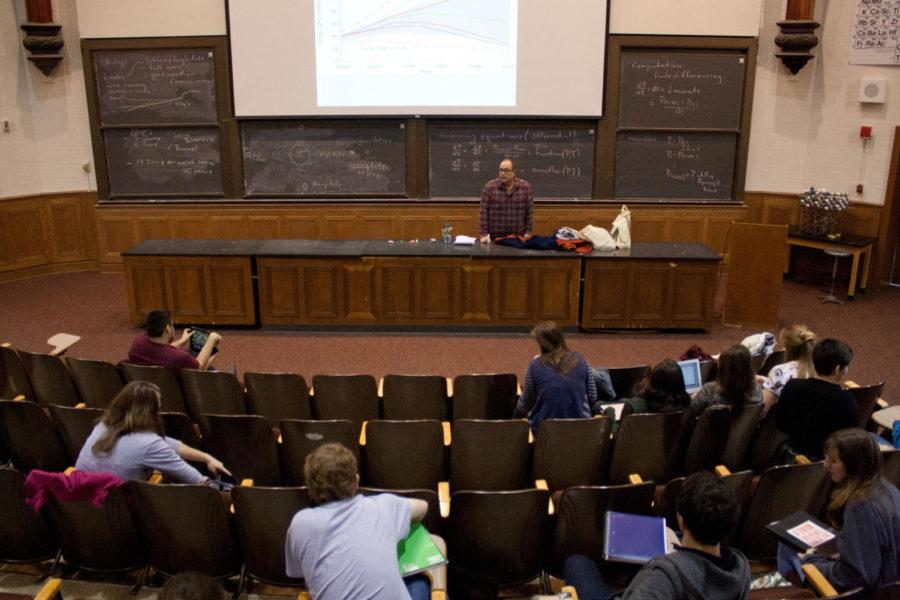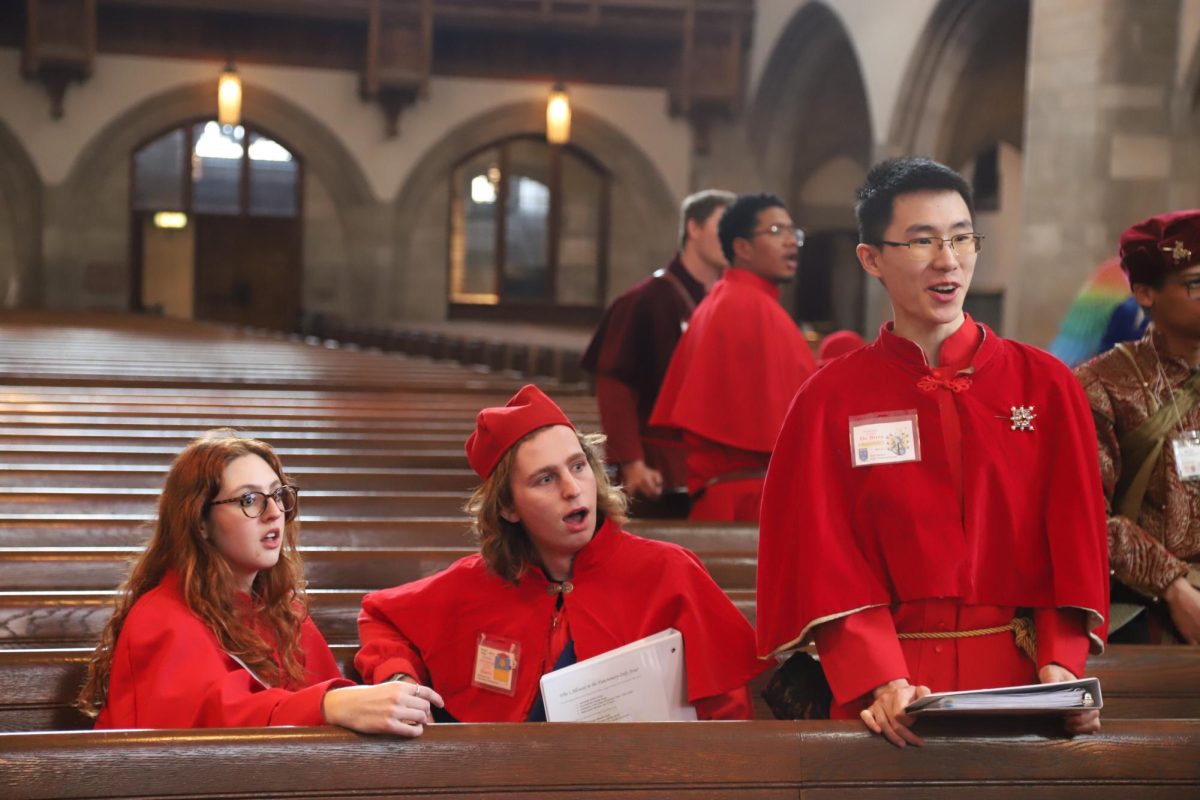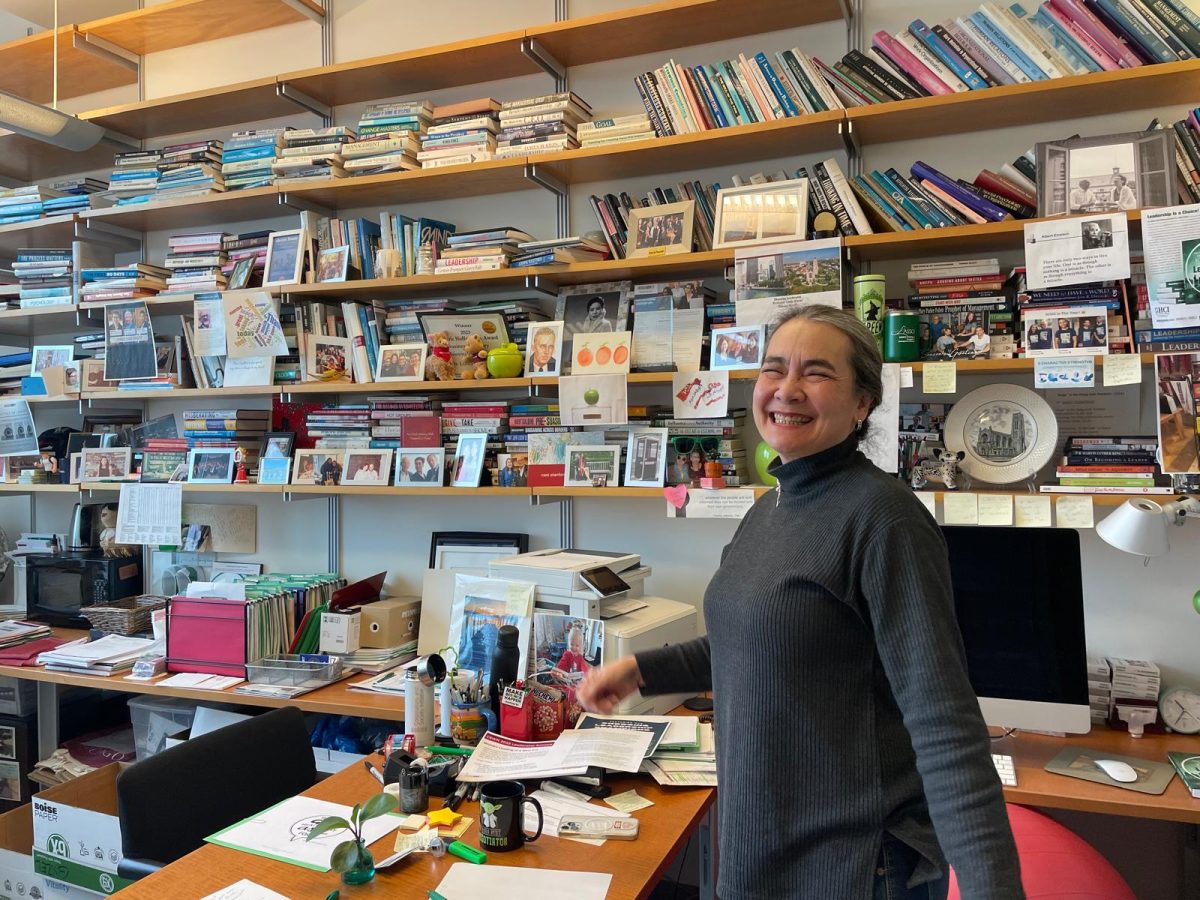Whether they like it or not, students come to the University of Chicago fully aware that, before they graduate, they will have to spend about one third of their time here meeting Core requirements. Chemistry majors will write essays on political theorists or social philosophers in their Sosc classes; future economists will analyze pieces of art; and nearly all students of the humanities will eventually take four quarters total of biological and physical sciences.
These classes are meant to introduce students to the “tools of inquiry used in every discipline,” according to the College’s admissions pitch. “The goal is not just to transfer knowledge, but to raise fundamental questions and become familiar with the powerful ideas that shape our society.”
But does every Core class accomplish this goal?
Hundreds of students enroll each year in one class in particular: Global Warming, a topics class that fulfills part of the physical sciences requirement. This is easily one of the most common routes taken through the Core. But there is a stigma haunting the class that, instead of introducing students to scientific “tools of inquiry” or raising “fundamental questions,” Global Warming is a waste of time and effort, and that, for most students, it serves the sole purpose of meeting graduation requirements.
What students suspect—and what professors are discovering—is that this stigma is tied up in a knot of institutional problems that have not gone away in the 12 years of the class’s existence, which range from chronic student apathy and a worrisome trend of academic dishonesty, to the administrative realities of faculty shortages and large class sizes. So far, there are more questions than answers.
At first glance, the class seems to be structurally sound. It is taught by two experts in the geophysical sciences who, according to their students, care that those who take the class are learning, and are having fun doing it.
David Archer, who specializes in environmental chemistry and the carbon cycle, created the class himself in 1996 and later authored its textbook, Global Warming: Understanding the Forecast. He has normally taught the class two quarters a year since then, with the exception of this autumn. (He will return in the spring.)
Douglas MacAyeal, who replaced Archer this quarter and has taught in the department for years, has brought with him his expertise in glaciology and a fresh outlook for the course. He has designed a new kind of labwork for the class that presents students with raw climate data, so they can draw conclusions themselves about climate change.
The class is also specifically designed to help any student, regardless of academic background and interest, to grasp scientific concepts and to become capable, critical thinkers. “By sort of focusing on a very narrow question but looking at it really hard you get an overview of science in general,” said Archer. By getting an understanding of where the forecast of climate change comes from, he explains, they will be able to make educated decisions regarding a very relevant and significant topic.
But in spite of all this, students continue to talk to their friends about how easy the class is, to boast about how they don’t have to attend lecture, and to complain that the class is a waste of their time.
Part of the problem with the physical sciences Core requirement is that there are two tracks that students can take. One option, taken almost exclusively by science majors or pre-meds who need the courses anyway, is to take General Chemistry or Physics. The second option, for those who have no interest in taking these challenging and time-consuming classes, is to take topical classes, like Global Warming.
For better or worse, this systematically divides students into two groups depending on the track they choose: those who want to take science classes, and those who are required to. And in the topical classes, there are more students who just don’t want to be there.
This becomes problematic when the topical classes themselves are further divided into those students who are generally interested in the material—or at least are willing to give it a chance—and those who just want to pass the class so that they can cross it off their list of Core requirements.
“I have noticed that my class seems to be broken in two populations,” explained MacAyeal.
“One population is the population that I’ve never seen before that does not attend my lectures, that doesn’t talk to me. The other half is the students that I see in class. I recognize them and talk to them before class. They ask questions and are obviously engaged.” According to MacAyeal, 80 out of the 180 students are present at his lectures—on a good day. For Archer, normally only about half of the students enrolled in his class attend lecture regularly.

Those who do attend the class learn from the course and have fun with it in the process.
Margaret Canton, a second-year undecided major taking the class this year with MacAyeal, has similar feelings. “I’m getting a lot more out of it than some of the other options for physical science. This class has been really engaging and exciting, and you can tell that Professor MacAyeal is really excited about the topic and excited to teach us about it,” she said. “I think more professors should be more like him in the way they structure their class.”
Third-year political science major Charley Kargman, who took the class with Archer in the spring of his second year and attended almost all of his lectures, had a similar experience. “I actually really enjoyed it when I took it. I had always believed in global warming but I felt like I had a better scientific understanding [of it] as an ecological phenomenon,” he said. “I really enjoyed Archer himself. He was a really great lecturer, and it was clear that he really cared about the subject himself and wanted to share this with the class.”
Despite his rewarding experience, Kargman adds that this is not what most students get out if it. “I believe that you get out of a course what you put into it,” he explained. “I just put normal effort in the class. I wasn’t the norm because other people treated [it] like a blow-off class.”
According to him, the students who saw it as an easy class weren’t able to reap the benefits that he did because of their lack of effort. “If you came in here thinking it was for a grade or requirement, you are not going to get as much out [of it] as someone who wants to see what Archer says about global warming,” he said. “It was sort of a self-fulfilling prophecy.”
As for students who miss class, their attendance is hardly necessary. Whether or not they learn from the class is practically irrelevant because attending lecture and engaging with the material is not necessarily imperative to passing the class or even receiving an A.
“It’s an easy A and I know many people who didn’t go to class and still managed to get an A,” said third-year public policy major Elizabeth Behrens, who took the class in the spring of her first year with Archer. “It was the sort of class where it was easy and it was totally open for not going and still getting an A somehow, some way.”
The ability of students to pass the class with little to no effort stems partly from its reputation. Because of its notorious easiness, some students go into the class not expecting—and therefore not willing—to have to work very hard for their A.
“A large reason that people are attracted to the class is that they know that there isn’t that much they have to do,” said second-year Patrick Ford, a Classics and philosophy double-major, who took the class with Archer last spring. “That explains how popular the class is.”
Tyler Leslie, a second-year majoring in political science, put it more directly: “Anytime you’re put in a class that you’re not super interested in, no matter how badly you want the grade, you are just not going to put in the same amount of effort.”
Considering that almost all of the students in the class are not science majors and are taking it solely to fulfill their Core requirement, it is not uncommon for students to feel this way, particularly when they are already overloaded with their other classes.
“I think that was definitely reinforced by the fact that it’s a culture of ‘this class is easy’ so students who want to focus on their harder, more ‘worthwhile’ class might decide to sleep in and miss Global Warming so they can put more time and energy into harder classes,” explained Behrens.
Archer, who puts extra effort into incorporating the more interesting aspects of science into his lectures, feels that he is doing everything he can. “I don’t think there’s anything I could do to force students to attend my class,” he said.
MacAyeal feels similarly.
Because of this, MacAyeal resorts to what he calls a sort of “devil’s pact” with those students who do not want to do the work. “They want an unstated pact where I will pass them with a high grade and not keep them out of law school, or business school, engineering, whatever. They will not complain about me and I will not complain about them,” he explained.
In order to accommodate the staggering number of students who feel this way, MacAyeal accedes to this compromise, requiring that these students engage at the minimum level by having a “pass/fail for an A” policy on the labs. If they make it look like they did the work, they’ll get credit for it.
“I do ask them to engage with the material and do everything they’re asked,” he said. Inevitably, however, “some students actually fake it and if they do it passably they can get the A.”
Archer defends the rigor of the material, if not the class. He says that other professors from other schools are baffled by the intensity of the textbook he uses. In his eyes, he sees the fact that many students easily pass his class as a sign that his teaching is effective. “The students learn a lot of very technical stuff and they do a lot of serious chemistry and physics and math and so if the class has a reputation of being easy in spite of the fact that they do all this stuff, I think that means that I’m doing my job.”
Although this may be true for the students who attend class, or at least read his textbook or watch his recorded lectures online, high marks do not necessarily indicate understanding. Often, students get by with a little help from their friends.
“There’s definitely some sort of passing down answers,” said Behrens. “There are different theories as to who does it, but there’s definitely been a passing down of previous tests, which kind of reduces the credibility of the class and makes the atmosphere just feel like even more of a blow-off easy class.”
The fact that there is a new professor this year has not stopped students from trying to cheat.
“I have a feeling that at one point one student came up to me and tried to hand in a homework assignment that was given last year by David Archer,” said MacAyeal.
He hadn’t assigned the homework the student tried to hand in.
“I am letting the students fall off the cliff,” admitted MacAyeal. “A little bit of discipline on my part in terms of grading would be fairer to everyone, including those who do put in the time.”
Master of the Division of Physical Sciences Michael Stein has taught here since 1985, and stressed that it is imperative to make students do their own work. “You need to have them doing something. So if the classes don’t have regular homework or they do and everyone knows where to find the solution and just copies them over, then you’re not going to be able to solve that problem.”
The solution would seem to be simple: Make the class harder, or catch the people who cheat. But there are structural challenges inherent to the physical sciences division as a whole.
For example, ensuring that every student is doing honest work is nearly impossible when lectures average in size at 150 students. “This is so hard to do in a really big class,” Stein said. “You have to chase down half (twice?) as many students and let them know, ‘You know, you need to do something if you want to pass the class.’ ”
Archer does not deny that smaller, discussion-based classes would likely help to engage students more, but he doesn’t know how it could be done. “There’s this theory about how lectures are bad and discussion is good, but it seems like the students need to be told what the material means and I need to do the lecture,” he said.
“I’m standing in a room with 200 undergraduates. I haven’t figured out what to do.”
Unfortunately, no one else seems to know what to do either, especially because of the limited available faculty in the sciences. Explains Stein: “Whether or not you believe that there are good reasons for that, it’s the norm of the field.” Science faculty at the University of Chicago, unlike faculty in other departments, are not required in their contract to teach Core classes, he says. If the University wants the best in the field, they can’t force professors to teach classes they don’t want to teach.
This can be good and bad, he explained. Because the faculty who teach the Core classes are volunteers, they tend to be enthusiastic about instructing the class. On the other hand, not everyone volunteers.
“Some departments, such as the physical science department, struggle to find enough faculty to have a viable major and graduate program,” he explained. “We can’t just stop offering [major] classes and reassign resources to Core classes like other departments can. Even if the people who can do it are willing to do it, it would literally mean not doing something else that’s also really important.”
Because the faculty is so constrained, it’s almost impossible to offer smaller discussion-based classes that might do a better job of involving students intellectually in the material. This leaves few viable options for reforming Global Warming.
One solution would be to instate a universal track for the physical sciences Core—all students, regardless of their major, would have to take some form of introductory science, such as General Chemistry or Physics 120. This way, all students would be subject to the same standards. However, professors question whether these standards would align with the ideals of the Core.
“The argument is that these are going to be the last science classes [students take],” Stein says. But introductory-level, quantitative courses like Gen Chem aren’t designed with that goal in mind. “These classes aren’t really about teaching you about what scientists do—they are about teaching you some science, so that you can go on and take more advanced classes.”
Students also don’t see why they should take a rigorous class if it doesn’t directly pertain to their career path or their studies. “Why make students miserable?” asked Behrens.
A second solution would place all students, including science majors, in a topical class.
In theory, this is a good idea, according to Stein. “I actually think that probably some science majors would benefit from a Core science class—to be able to step back and see what scientists do,” he said. “You can get a bachelor’s degree in the scientific field and, depending on what you actually did, you may not have a very clear idea of what scientists actually do.”
MacAyeal believes that incorporating science majors into the topical classes would provide more educational resources and motivation for those not as interested in science. “Students teach each other more than professors want to admit. Students emulating other students is a huge motivator and factor.”
There are fears, however, that grouping non-majors and majors together in these courses would prevent science students from learning as much as they could on their own.
“There is this point of view that, somehow, the ‘smart physics and chemistry students’ will be held back, and their lives will be ruined,” if they have to match pace with artists or economists, MacAyeal said.
Stein believes that this would repel prospective science students from the College. “In practice, that would drive away most of the good science students,” he said. “That’s one of the key reasons that we allow for these separate tracks.”
Dylan Lynch, a fourth-year chemistry major, shares the sentiment. “It would completely derail the majors, because you would add classes that are already much longer than political science or English.” He added that topical classes would be redundant, teaching science students basic material that they are already learning in their major classes.
Although Kargman maintains that science students would likely provide a valuable example for other students, he recognized that majors might not reap similar benefits.
“I think the pre-meds and science kids would be really frustrated by it,” he said. “When you have to take a class with other people who aren’t at that level, you will find a lot more students who are less likely to participate or take it seriously, because they were taught it years ago.”
And from the professor’s perspective, the task of teaching students with such varied scientific backgrounds and interests would be challenging. “It would be difficult to teach the whole spectrum of students,” Archer said. “Science students might get bored at the slow pace and me having to keep going over concepts for the non-science majors.”
As of now, no one is sure of how to remedy the Global Warming issue. Professors in the physical sciences, however, have recognized the issue and are taking positive steps toward a solution.
MacAyeal shared an e-mail thread among teachers in response to a Maroon editorial last month, “A New Scientific Method,” which suggested the physical sciences Core requirement be entirely revamped.
In the thread, members of the physical science division began the process of reassessing the physical sciences Core, proposing ideas for new classes, and discussing why students aren’t getting out of their Core science classes what they should be.
“It may not be visible to students in the short run but I’m definitely thinking about it,” Stein said. “I’ll need cooperation if anything is going to change. I need more resources and cooperation from Administration, and then I think in a couple of years something could actually happen.”
Both Stein and MacAyeal believe that at some point in the process, students should be able to share their perspective because, as MacAyeal put it, “It is not a one sided issue. [Students] too created the intellectual environment.”









